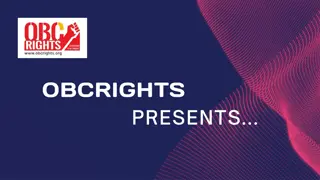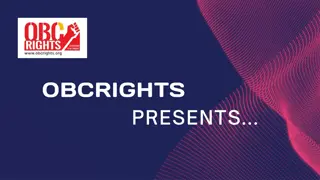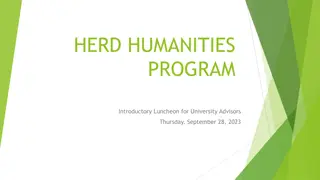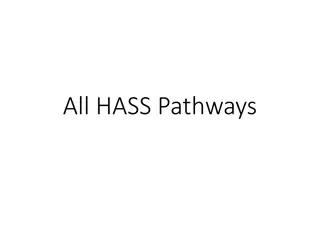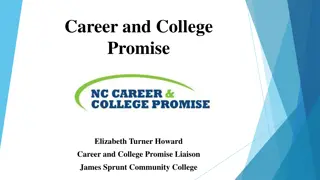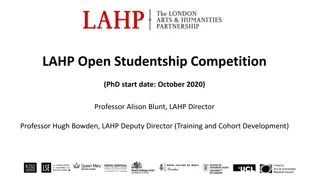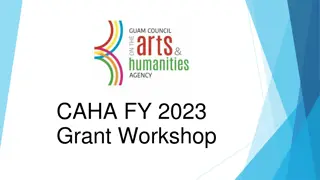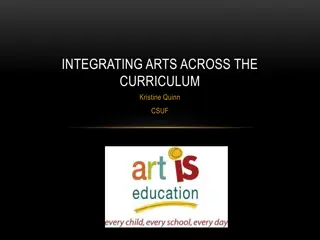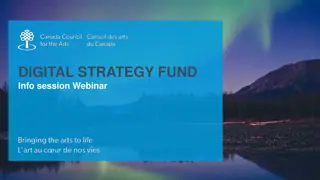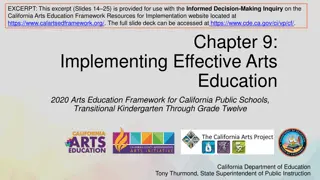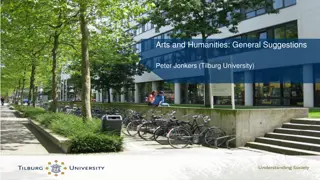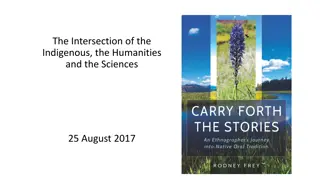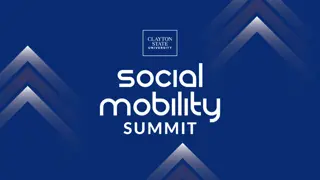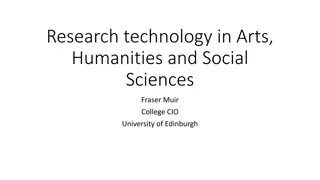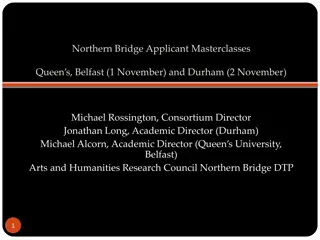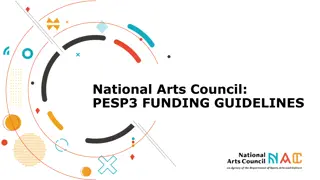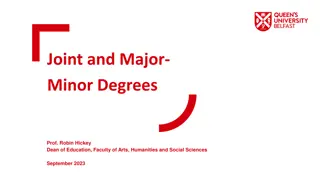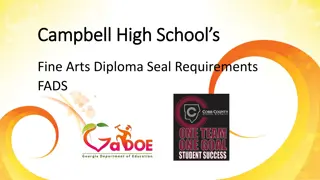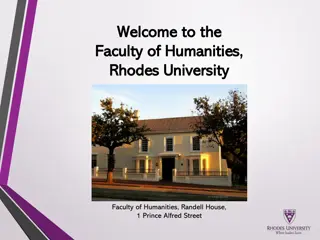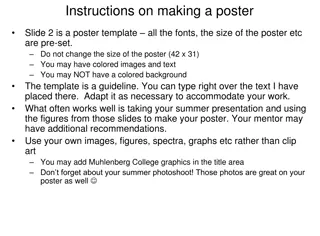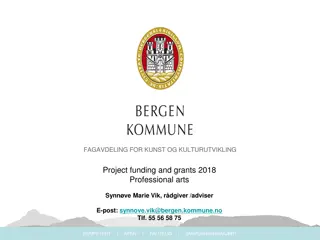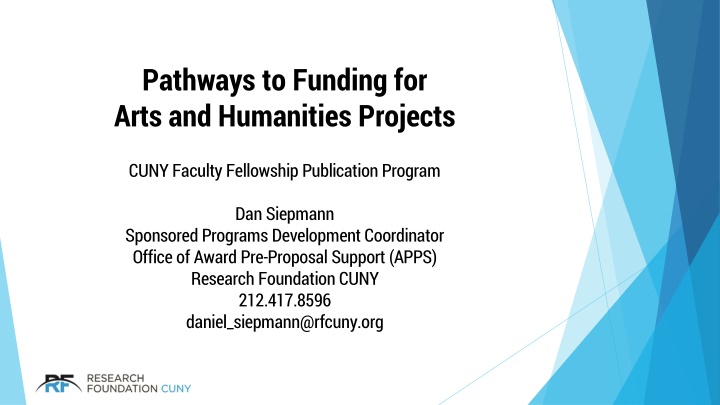
Funding Opportunities for Arts and Humanities Projects at CUNY
Discover pathways to funding for arts and humanities projects through the CUNY Faculty Fellowship Publication Program. The Office of Award Pre-Proposal Support provides resources, workshops, and consultations to enhance grant-seeking capabilities among CUNY faculty and researchers, fostering a culture of research within the institution.
Download Presentation

Please find below an Image/Link to download the presentation.
The content on the website is provided AS IS for your information and personal use only. It may not be sold, licensed, or shared on other websites without obtaining consent from the author. If you encounter any issues during the download, it is possible that the publisher has removed the file from their server.
You are allowed to download the files provided on this website for personal or commercial use, subject to the condition that they are used lawfully. All files are the property of their respective owners.
The content on the website is provided AS IS for your information and personal use only. It may not be sold, licensed, or shared on other websites without obtaining consent from the author.
E N D
Presentation Transcript
Pathways to Funding for Arts and Humanities Projects CUNY Faculty Fellowship Publication Program Dan Siepmann Sponsored Programs Development Coordinator Office of Award Pre-Proposal Support (APPS) Research Foundation CUNY 212.417.8596 daniel_siepmann@rfcuny.org
I. Welcome to Award Pre-Proposal Support (APPS) Office opened in December 2015 Mandated to further a culture of research at CUNY and expand capacity of grant-seekers The only cross-CUNY division dedicated exclusively to faculty proposal development Shares strategic grant opportunities cultivates faculty collaborations convenes CUNY staff and faculty around funding best practices and multidisciplinary initiatives Initiatives include Individual consultations with faculty, researchers, and grad students of all disciplines and seniority discovering funding prospects, and workshopping specific proposals General seminars on grant design and tactics Targeted forums on specific themes or trends in funding Peer review of grant proposals implemented March 2016 with NSF/NIH grants, and this summer, expansion to all grants Funding opportunity databases providing CUNY-wide access, paid for by RFCUNY Faculty Travel for Grant Development Internal Funding paused till July 2019
Examples of APPS Targeted Workshops on Strategic Themes NSF CAREER Award Program April 8, 2016; March 17, 2017; January 26, 2018 NSF Partnerships for International Research and Education (PIRE) June 10, 2016 Arts and Humanities Philanthropy Forum December 8, 2016 BroaderImpacts in Grantwriting April, 27, 2017 NSF Education and Human Resources Grants Forum May 17, 2017 International Research and Education Forum November 8, 2017 Defense and Intelligence Grants Forum May 17, 2017 Convergence Research September 15, 2018 Research Fellowships in Japan October 12, 2018 Strategies for Arts and Humanities Grantseeking November 15, 2018 SCORE Grant Program Strategies and Insights Workshop January 25, 2019
II. Matching Funding Pathways to the Work You Want Accomplished First, ask yourself two separate questions: will I work alone or on a team? will I work inside or outside an institution? Your answers will correspond to three different types of academic labor: Book projects/monographs/commissions for new works [individual labor, solitary context] Theory-of-change or evaluative investigations [individual or collaborative labor, institutional context] Community-based projects [collaborative labor, institutional context]
Then, ask yourself, what species of funder links strongest to the proposed labor? Internal (e.g. PSC-CUNY, college-specific awards) Mostly monograph/commission projects Academic Professional Groups (e.g. the Modern Language Association or Academy of Arts and Sciences) Mostly monograph/commission or theory-of-change projects Government/NGO (e.g. NEA, NEH, int l equivalents like research/arts councils) Mostly theory-of-change or community-based projects Private Foundation (e.g. Ford Foundation, W.T. Grant Foundation, smaller family foundations) Mostly theory-of-change or community-based projects
Finally,ask yourself, who is best equipped to shepherd this proposal at my school? The Grants/Sponsored Programs Office may be best if The funder requires complex authorization, compliance, budgetary, or strategic information Your college s relationship to the funder is institution-to-institution, not person-to-person The grant requires personnel management, equipment purchases, and other tangibles tied to a work plan or budget The decision-maker is a panel of external specialists (your peers) in the grant s subject matter The Development Office (or your college Foundation) may be best if The funder is a part of your local community, or situated within the five boroughs/tri-state area Your college is already receiving donations from the funder, or some person-to-person relationship exists There are no stated deliverables, final reports, or evaluation components (intended award is more of a gift ) The decision-maker is a program officer with sole discretionary power, or a small group of non-specialists (e.g. the blood relatives on the board of a family foundation)
III. Private Foundations 101 Private foundation law of the jungle : people give money to people who they know and like. If you know one foundation, you know one foundation what applies to one doesn t necessary apply to another. When approaching a private foundation, take a step back ask yourself what is the grant-maker seeking to do? Foundations are thinking about how do we distinguish ourselves how do we keep ourselves relevant? Funding priorities are weather systems chats with program officers tell you where the wind is blowing. Finding the right foundation match is like dating. No. 1 objective is to secure meetings with program officers. Come with a strong idea(s) ready. Establish yourself (in their eyes) as a thought leader in a given area, so they think of your name when a need arises. Be patient when networking for foundation grants. Keep turning up, keep finding small ways to amplify your name.
IV. Partnerships As arts/humanities faculty, you re trained to work on your own. But competitive grant-seeking requires deliberate collaborations with other institutions/people/expertise areas. Partnerships are how you leapfrog over your own institutional deficits, resource lacks, and expertise blind-spots. Ask yourself: how can I involve people who participate in the same research question or project vision from different vantages? Remember, as higher education faculty, you offer external collaborators a lot of value as well. Most likely, there is a non-academic, external field encompassing your discipline or research questions: grassroots activists, NPOs, NGOs, government agencies, and even for-profit companies. Seek out and become a part of conversations with these practitioners. Cultivating partners is crucial to meeting new funders. External actors that show affinity for your research will invite you to show up to their events when their funders will be in the room.
V. Leveraging Your Institution Align with CUNY institutes/divisions that already have funder relationships. Become an appendage of a larger endeavor where your vision adds value. Develop relationships with the top faculty grant-getters on your campus. Map the ideology and norms of your institution, esp. if your project concept is activist or outside the box where are the pitfalls, and where are the safety zones, among departments, offices, or divisions? Use your institution s existing infrastructure and built-in resources to pilot your project concept on a small-scale
VI. Integrating Your Academic Career and Grant Projects 9 times out of 10, funders won t support the same research agenda you ve been pursuing for 10 years. Expand your horizons of what research can be e.g. curricula, pedagogy, convenings, artworks, and social practice projects. Design research projects whose outcomes will serve the needs of both the academy and practitioners. Pursue new directions that have visible, transformative applications and contexts. Translate your long-term research project(s) to ask value-laden questions that have public consequences. Conceive of your classroom space as a vital asset for grant applications and programmatic work. Major funders flock to academic conferences to figure out which people are worth investing in. Meet them!
VII. Case Study One You are an assistant professor whose scholarship focuses on arts learning outcomes for children in disinvested neighborhoods. You discover that a regional family foundation frequently gives grants to an arts education non-profit nearby your college. You gradually build a relationship with the staff and Board of the non-profit by showing up to their special events and volunteering twice a month at their program facility. The nonprofit is invited to submit a grant proposal to the foundation at a substantially higher amount, but the foundation mandates a strong evaluation component Knowing your expertise, the nonprofit requests that you serve as a paid evaluator for the grant project, but also invites you to assist in the program design you construct a logic model that speaks directly to your personal scholarship, and provides evidence for future academic publications that support a tenure bid. The foundation program officer is impressed by your savvy deliverable at the project end and invites you to present at a funder roundtable of other foundations prioritizing arts education. After sharing your work, another attending foundation that already makes gifts to your college suggests making grants to you directly. You work with your grants office to develop a compliant and competitive proposal, but also liaise with your development office to successfully manage your new relationship with the foundation staff
VIII. Case Study Two You are an assistant professor who specializes in cultural memory studies of African migrant communities in America. You want to pursue a digital humanities project that first requires building a collection of ephemera, artifacts, and primary sources. None of your internal award applications or American Historical Association grants have worked out so far. But you discover that the Graduate Center has an Institute for Research on the African Diaspora and the Caribbean (IRADAC)! You meet with the senior faculty in charge and discover a lot of synergy between your research agendas. You always thought that the NEH s Common Heritage program was perfect for your work, but as an individual, you were ineligible to apply. You convince IRADAC to submit a grant to Common Heritage : they will build and host a scholarly hub for digitized materials online. You also seek out and receive a letter of commitment from the Museum of Contemporary African Diasporan Arts (MoCADA) in Brooklyn to collaborate on related public programs. You collaborate with MoCADA s staff grantwriter, and your campus grants office, to submit an amazingly competitive proposal!
IX. Closing Thoughts Success most often involves slowly cobbling together funding from patchwork sources. Early career grant-seekers will make initial breakthroughs with smaller, individual awards. Grant-writing is a muscle, and few higher education cultures emphasize its growth. Don t become discouraged. Serve on review panels. You ll see some of the best proposals in your field. Above all else, grants-person-ship requires: Shameless promotion of your work to anyone willing to listen. No one will know that you re viable to support unless you re putting yourself out there. Envisioning your scholarship/projects as an intervention or activism. Make the case that the grant money will push some needle, somewhere, for our intellectual, social, political, or cultural life.


